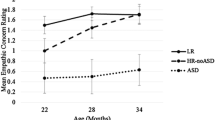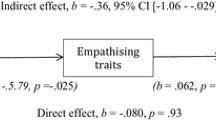Abstract
Empathy deficits represent an important social impairment in autism spectrum disorders (ASD), but little is known about the early development of empathy prior to diagnosis. This study examined empathic responding to parental distress in toddlers at risk for an ASD. Children later diagnosed with an ASD engaged in less empathic responding at 24 and 30 months than children with no later diagnosis. Lower empathic responding was associated with higher autism symptomatology at 30 months. This is the first study to examine empathy deficits in response to parental distress in toddlers prior to ASD diagnosis. Early empathic responding may represent a unique developing social skill that indexes the overall severity of later ASD symptomatology in at-risk children.

Similar content being viewed by others
References
American Psychiatric Association. (2000). Diagnostic and statistical manual (4th Ed.), Text Revision.
Bacon, A. L., Fein, D., Morris, R., Waterhouse, L., & Allen, D. (1998). The responses of autistic children to the distress of others. Journal of Autism and Developmental Disorders, 28, 129–142.
Baron-Cohen, S. (2002). The extreme male brain theory of autism. Trends in Cognitive Sciences, 6, 248–254.
Baron-Cohen, S., Alan, A. M., & Frith, U. (1985). Does the autistic child have a ‘theory of mind’? Cognition, 21, 37–46.
Charman, T., Swettenham, J., Baron-Cohen, S., Cox, A., Baird, G., & Drew, A. (1997). Infants with autism: An investigation of empathy, pretend play, joint attention, and imitation. Developmental Psychology, 33, 781–789.
Dissanayake, C., Sigman, M., & Kasari, C. (1996). Long-term stability of individual differences in the emotional responsiveness of children with autism. Journal of Child Psychology and Psychiatry, 37, 461–467.
Dyck, M. J., Ferguson, K., & Shochet, I. M. (2001). Do autism spectrum disorders differ from each other and from non-spectrum disorders on emotion recognition tests? European Child and Adolescent Psychiatry, 10, 105–116.
Eisenberg, N., & Fabes, R. (1998). Prosocial development. In N. Eisenberg (Ed.), W. Damon (Series Ed.), Handbook of child psychology: Vol. 3. Social, emotional, and personality development (5th ed., pp. 701–778). New York: Wiley.
Gotham, K., Pickles, A., & Lord, C. (2009). Standardizing ADOS scores for a measure of severity in autism spectrum disorders. Journal of Autism and Developmental Disorders, 39, 693–705.
Hutman, T., Rozga, A., DeLaurentis, A. D., Barnwell, J. M., Sugar, C. A., & Sigman, M. (2010). Response to distress in infants at risk for autism: A prospective longitudinal study. Journal of Child Psychology and Psychiatry, 51, 1010–1020.
Knafo, A., Zahn-Waxler, C., Van Hulle, C., Robinson, J. L., & Rhee, S. H. (2008). The developmental origins of a disposition toward empathy: Genetic and environmental contributions. Emotion, 8, 737–752.
Lord, C., Risi, S., Lambrecht, L., Cook, E. H., Leventhal, B. L., DiLavore, P. C., et al. (2000). The autism diagnostic observation schedule-generic: A standard measure of social and communication deficits associated with the spectrum of autism. Journal of Autism and Developmental Disorders, 30, 205–223.
Lord, C., Rutter, M., & Le Couteur, A. (1994). Autism diagnostic interview-revised: A revised version of a diagnostic interview for caregivers of individuals with possible pervasive developmental disorders. Journal of Autism and Developmental Disorders, 24, 659–685.
Martin, G. B., & Clark, R. D. (1982). Distress crying in neonates: Species and peer specificity. Developmental Psychology, 18, 3–9.
Mullen, E. M. (1995). Mullen scales of early learning. Circle Pines, MN: American Guidance Service.
Oberman, L. M., & Ramachandran, V. S. (2007). The simulating social mind: The role of the mirror neuron system and simulation in the social and communicative deficits of autism spectrum disorders. Psychological Bulletin, 133, 310–327.
Sagi, A., & Hoffman, M. L. (1976). Empathic distress in the newborn. Developmental Psychology, 12, 175–176.
Sigman, M. D., Kasari, C., Kwon, J., & Yirmiya, N. (1992). Responses to the negative emotions of others by autistic, mentally retarded, and normal children. Child Development, 63, 796–807.
White, S., Hill, E., Happe, F., & Frith, U. (2009). Revisiting the strange stories: Revealing mentalizing impairments in autism. Child Development, 80, 1097–1117.
Yirmiya, N., Sigman, M. D., Kasari, C., & Mundy, P. (1992). Empathy and cognition in high-functioning children with autism. Child Development, 63, 150–160.
Yoder, P., Stone, W. L., Walden, T., & Malesa, E. (2009). Predicting social impairment and ASD diagnosis in younger siblings of children with autism spectrum disorder. Journal of Autism Developmental Disorders, 39, 1381–1391.
Young, S. K., Fox, N. A., & Zahn-Waxler, C. (1999). The relations between temperament and empathy in 2-year-olds. Developmental Psychology, 35, 1189–1197.
Zahn-Waxler, C., Radke-Yarrow, M., Wagner, E., & Chapman, M. (1992). Development of concern for others. Developmental Psychology, 28, 126–136.
Acknowledgments
This study was supported by grants from the National Institute of Health: R01 HD047417 and R01 HD057284, Autism Speaks, and the Marino Autism Research Institute. The authors would like to thank the children and families who participated in this longitudinal study. In addition, the authors are grateful for the behavioral coding contributions of Haley Gordon and Gizelle Robinson, as well as the valuable feedback provided by Naomi Ekas, Heather Henderson, Alexandra Quittner, and Kristin Lindahl. This study was originally prepared as the first author’s master’s thesis.
Author information
Authors and Affiliations
Corresponding author
Rights and permissions
About this article
Cite this article
McDonald, N.M., Messinger, D.S. Empathic Responding in Toddlers at Risk for an Autism Spectrum Disorder. J Autism Dev Disord 42, 1566–1573 (2012). https://doi.org/10.1007/s10803-011-1390-y
Published:
Issue Date:
DOI: https://doi.org/10.1007/s10803-011-1390-y




